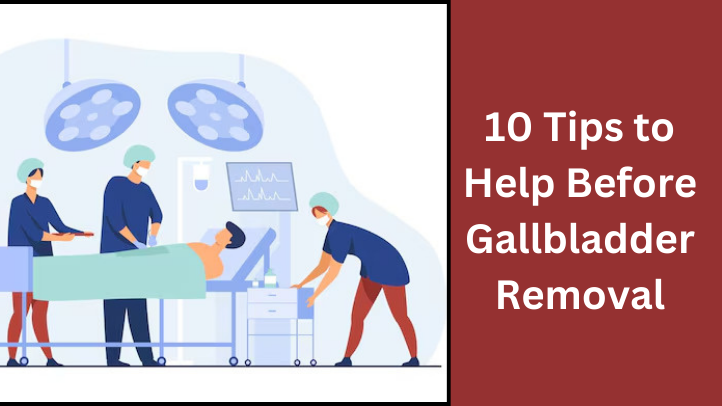Blog

10 Tips to help before gallbladder removal – Gallbladder removal, or cholecystectomy, is a common surgery for various issues related to the gallbladder, which is a small organ that is located under the liver. Its main job is to hold bile, which is a fluid that helps to digest fats. People may need to have their gallbladder removed due to problems with bile production, storage, or release. Getting ready for this surgery, whether it’s laparoscopic or open, is crucial for a smoother process and faster healing. Here are the top 10 tips to help before gallbladder removal which can aid patients in a quicker recovery.
Getting ready for gallbladder surgery is not just about being physically fit. It also involves preparing mentally, emotionally, and practically to have a good surgery and recover well. Knowing what the surgery involves, planning for how you’ll recover, and keeping in touch with your doctor can help you feel confident and calm before the surgery. It’s important to remember that everyone’s experience is different, so it’s a good idea to work with your doctor to make a plan that fits your needs. Taking these steps ahead of time can make the surgery go smoother and help you get back to your usual activities faster.
Getting ready for gallbladder surgery is important for a good outcome and healing. Here are some key tips to help manage stress before surgery, stay healthy, and prepare for recovery. This guide includes 10 proven tips to help patients feel more prepared for the operation, leading to easier surgery and better healing. Being well prepared is crucial for a successful surgery and a quicker return to everyday life.
#1. Understanding the procedure – Understanding the process can help alleviate fear and anxiety about the unknown aspects of surgery, as well as allow you to make informed decisions about your health. Compile a series of inquiries for your doctor. Think about the inquiries about how long the surgery will take, the amount of time it takes to heal, possible dangers, and how it might impact your ability to digest food afterwards. Through this, you will be better prepared and better equipped to face the upcoming phase.
#2. Following the pre-surgery instructions – Following the pre-surgery instructions such as fasting and medication use can help you get better results after a smooth surgery. Before your surgery, you’ll probably have to fast for 6-12 hours. Listen to your doctor’s rules about what you can eat and drink. Talk to your doctor about your medicines, you might have to stop some, such as blood thinners, to get better outcomes.
#3. Plan your post-surgery recovery – Plan for 1-2 weeks to recover from laparoscopic surgery, and possibly longer for open surgery. Get help at home if necessary, take time off work and avoid activities that could hurt your abdomen during the first recovery period.
#4. Arrange support and transport – Having someone for help at home, especially in the beginning, period of your surgery is very useful. They can help with tasks, cooking, taking medicine, and ensuring safe travel.
#5. Prepare your home and surroundings for recovery – Create a cosy recovery spot at home that’s easy to reach for things like water, medicines, and fun activities. Choose clothes that are loose and won’t bother your healing area, especially if you’ve had birth surgery. Having this setup around you can speed up your recovery and help your well-being.
#6. Consume a balanced and light diet before surgery – A few days before your surgery, eat light and easy-to-digest foods like fruits, vegetables, and lean meats. Avoid greasy, spicy, and heavy foods. Drink lots of water to stay hydrated and help your body get ready for the surgery.
#7. Adopt a healthy lifestyle – You can adopt a healthy lifestyle by quitting smoke at least a few weeks before surgery to reduce the risk of complications and improve healing. As well as limit the use of alcohol at least 2 to 3 weeks before surgery to reduce complications and minimize interactions with anaesthesia and medications.
#8. Maintain a balanced diet – Eat healthy foods like fruits, veggies, lean proteins, and whole grains to strengthen your immune system. Drink plenty of fluids in addition to consuming lots of water to help your body heal faster.
#9. Get ready for changes in your diet after surgery – Prepare for changes in your diet after surgery, as your body adapts to not having a gallbladder. Begin with simple foods and slowly add more. Avoid high-fat foods and slowly add more. Avoid high-fat foods that could upset your stomach after surgery.
#10. Pay attention to Signs that something might be wrong – Watch for signs like fever, too much pain, redness, or discharge from the cut area, and tell your healthcare team right away. Learn when to get urgent medical help and have emergency contact info easy to find.
By following these tips, you’ll be well-prepared for your gallbladder removal surgery, making the experience more manageable and helping to facilitate a quicker recovery. Always consult your healthcare provider for personalized advice tailored to your specific needs, as this will help you achieve the best possible results.
Copyright © 2025 Dr Ahuja Clinic. All Rights Reserved | Marketing by : WebHopers
Website Design by CSW Technologies